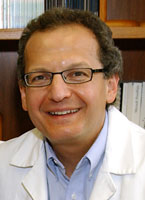Samuel Klein, MD

Samuel Klein, MD, is the William H. Danforth Professor of Medicine and Nutritional Science, professor of cell biology and physiology and chief of the Division of Geriatrics and Nutritional Science. He also is director of the Center for Applied Research Sciences within the newly formed Institute for Clinical and Translational Sciences, director of the Center for Human Nutrition and medical director of the Washington University Weight Management Center.
Klein earned his medical degree in 1979 from Temple University, then completed internal medicine residency training and a nutrition fellowship at University Hospital in Boston. He later earned a master’s degree in nutritional biochemistry and metabolism from the Massachusetts Institute of Technology and completed gastroenterology fellowship training at The Mount Sinai Hospital in New York. Klein joined the Washington University faculty in 1994 and became a professor in 1997.
Klein’s major research interest involves learning how obesity contributes to metabolic diseases. His work has increased the understanding of normal fat physiology in the body, the alterations in fat metabolism associated with obesity and fatty liver disease, and how weight loss improves the metabolic problems caused by obesity.
He has also conducted important clinical trials to evaluate the safety and efficacy of obesity therapies. Klein conducted the first randomized, controlled trial to evaluate the effectiveness of the low-carbohydrate Atkins diet as a therapy for obesity, which demonstrated that the diet produces greater short-term weight loss than conventional diets. He also evaluated the effects of abdominal liposuction on insulin sensitivity and coronary heart disease risk factors, demonstrating that fat removal alone does not alter risk. He initiated the first randomized, controlled study of whether losing weight could improve physical function in obese elderly people, discovering that weight loss and exercise did reduce frailty and improve quality of life.




